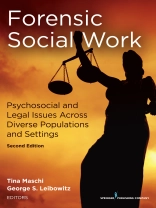This extensively revised edition reviews the latest research and practices in forensic social work. Readers learn to integrate socio-legal knowledge when working with diverse populations in a variety of settings. Noted interdisciplinary contributors review the most common forensic issues encountered in the field to better prepare readers to deal with the resulting financial, psychological, emotional, and legal ramifications. Using a human rights and social justice approach, the book demonstrates the use of a forensic lens when working with individuals, families, organizations, and communities that struggle with social justice issues. Each chapter features objectives, competencies, Voices From the Field, a conclusion, exercises, and additional resources.
The book is ideal for MSW and BSW courses in forensic social work as well as forensic/legal courses taught in criminal justice and psychology. Practitioners working in a variety of settings who must have a working knowledge of forensic social work will also appreciate this comprehensive overview of the field.
Key Features:
- Highlights working with various populations such as minorities, immigrants, veterans, the elderly, LGBTQ individuals, people with disabilities, substance abusers, trauma survivors, and more.
- Reviews the field’s conceptual and historical foundation and pertinent laws to better prepare readers for professional practice (Part I).
- Introduces the most common forensic issues encountered when working in various settings, including health care, social and protective services, the child welfare system, the criminal justice system, school systems, immigration services, addiction treatment facilities, and more (Part II).
- Provides a wealth of practical guidance via case studies and interviewing, assessment, and intervention tips.
- Voices From the Field written by seasoned practitioners introduce common situations readers are likely to encounter.
- Highlights the 2015 Council on Social Work Education’s (CSWE) Policies and Accreditation Standards throughout the text.
- Greatly expanded coverage from 26 to 33 chapters with more information on health care, housing, employment, the juvenile and criminal justice system, adult protective services, and the dynamics of oppression.
- New Part III dedicated t
New to this Edition:
Despre autor
George Stuart Leibowitz, Ph.D., LICSW, is Professor at Stony Brook University, School of Social Welfare in New York.












